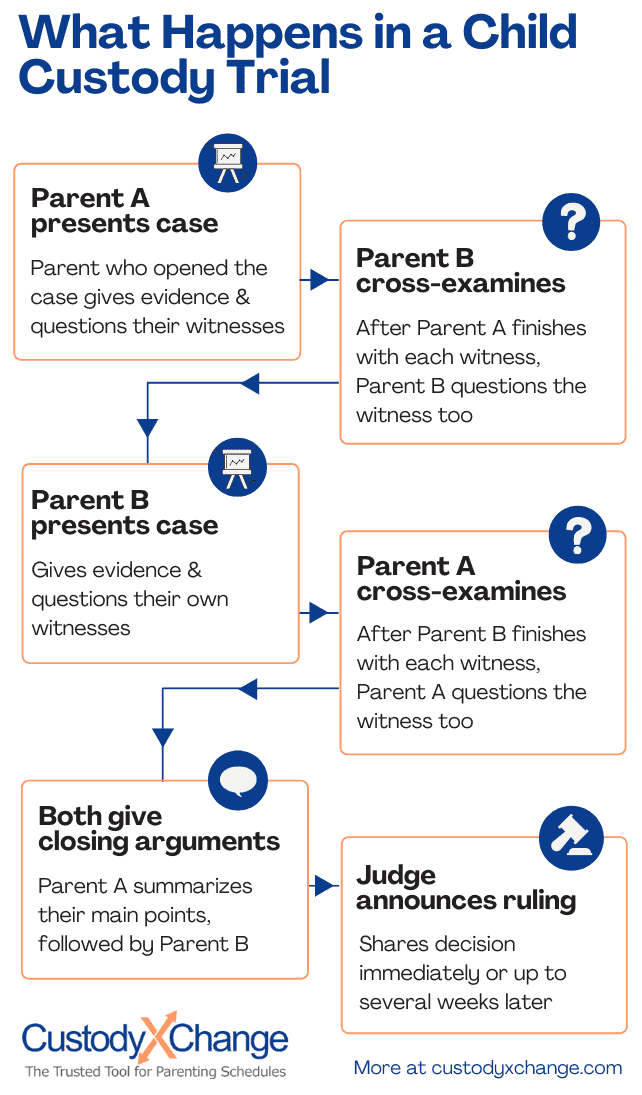Maryland Child Custody Trials: What to Expect
If you don't settle with your child's other parent, your case will end up at trial, also known as a merits hearing or contested hearing. At trial, a magistrate or judge listens to parents' arguments. A magistrate makes a recommendation to a judge, and a judge makes a final order. Some trial procedures vary by case and county.
Preparation
Prior to trial, each parent can submit a proposed parenting plan, and if your case had a custody evaluation, the court receives an evaluation report. Typically, the report is only available to the court and lawyers on the case, though some judges allow parents to read it. Neither party can make copies.
Evidence, in the form of exhibits and witnesses, is an important part of your trial. You will likely spend months gathering all the evidence you need, such as:
- Medical reports, criminal records and other documents
- Photos and videos of you and your child
- Messages between parents
- Parenting journal entries
- Character reference letters
Witnesses have knowledge relevant to the case. Expert witnesses provide professional opinions and are appointed by the court or hired by a party. Lay witnesses usually testify about their personal experience of a situation.
Sit down with your witnesses ahead of time to discuss what will happen in court. With the exception of custodians of records, who testify to the authenticity of records, witnesses cannot testify to something they did not directly observe.
Parents learn about each other's evidence through a process called discovery, which generally takes at least 30 days. During discovery, each parent can request documents relevant to the case (such as emails and financial statements) and interview the other's witnesses. Witnesses must cooperate if there's a deposition order in place.
Scheduling
A trial's start date depends on the court's calendar. Maryland tries to process cases within 12 months of the plaintiff opening the case, although this doesn't always happen.
Less contentious cases usually get to trial sooner, while more difficult cases often require more time for discovery or other matters.
Trials typically conclude after a single day, though some can stretch over a few days or weeks. The court tries to schedule your trial for consecutive days if multiple dates are needed. However, court schedules are often congested, so there could be weeks or even months between your trial dates.
Procedure
Divorce and custody trials take place in a courtroom in front of a judge and without a jury. The court could assign a magistrate to hear your case instead if your trial requires only a few hours.
Trials are open to the public, though extraordinary circumstances may require the court to limit access.
If you have an attorney, they will question you and your witnesses, present exhibits and speak with the judge for you. If you represent yourself, you will have to present your own case. Note that you cannot speak to the judge outside of court.

The parent who filed the case (the plaintiff) questions their witnesses and presents their exhibits first. The other parent (the defendant) can also question these witnesses through cross-examination to gather information that will help their case.
Next, the defendant repeats the process, questioning their witnesses and presenting exhibits. Then, the plaintiff can cross-examine the defendant's witnesses.
If there's a best interest attorney in the case, they may present evidence on the child's behalf. They cannot testify as a witness or be cross-examined.
Finally, both parties give closing arguments to summarize their points.
The judge may announce their ruling immediately afterward or days or weeks later. Magistrates can only recommend rulings. If either parent disagrees, they have 10 days to file an objection, which prompts a judge to review the recommendation. If the judge doesn't find any issues, they'll approve it.
You must follow the ruling in your case from the moment it's made. Once written and signed, it becomes a final order, which replaces any temporary orders in the case.
Your options for changing a final order include appealing to a higher court within 30 days (if there was a legal error) or applying for a modification (if your circumstances change substantially).
Tips
- Dress like you're going to a job interview.
- Arrive early so you can find your courtroom, and keep your calendar open for the day.
- Do not bring your child unless they're testifying (which is rare).
- Don't talk about the case in or near the courthouse.
- Show respect to everyone. Refer to the judge as "Your Honor," and never interrupt.
- Don't be too friendly with witnesses who are supposed to appear unbiased.
- Be honest when you are testifying; you are under oath.
- Take your time answering questions, but don't ramble.
- Ask for clarification if you don't understand a question.
- Admit when you don't know something.
- Remain respectful, even if you are upset by the ruling.
Staying organized
Going to trial over child custody requires serious organization.
You'll need to present evidence, which could range from messages with the other parent to a calendar showing when you care for your child. You should also present a proposed parenting plan and schedule to the court.
The Custody X Change app lets you create and manage all of these elements in one place.
With parent-to-parent messaging, personalized custody calendars, a parenting plan template and more, Custody X Change makes sure you're prepared not only for trial but for every step of your case.
Take advantage of our technology to get what's best for your child.
